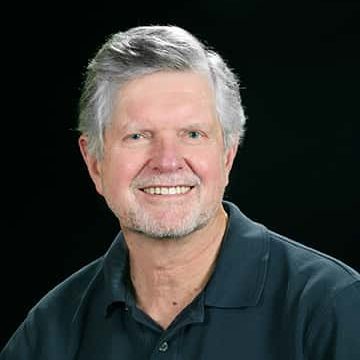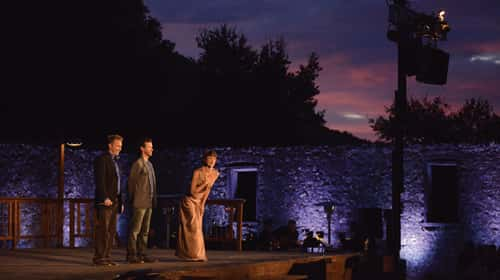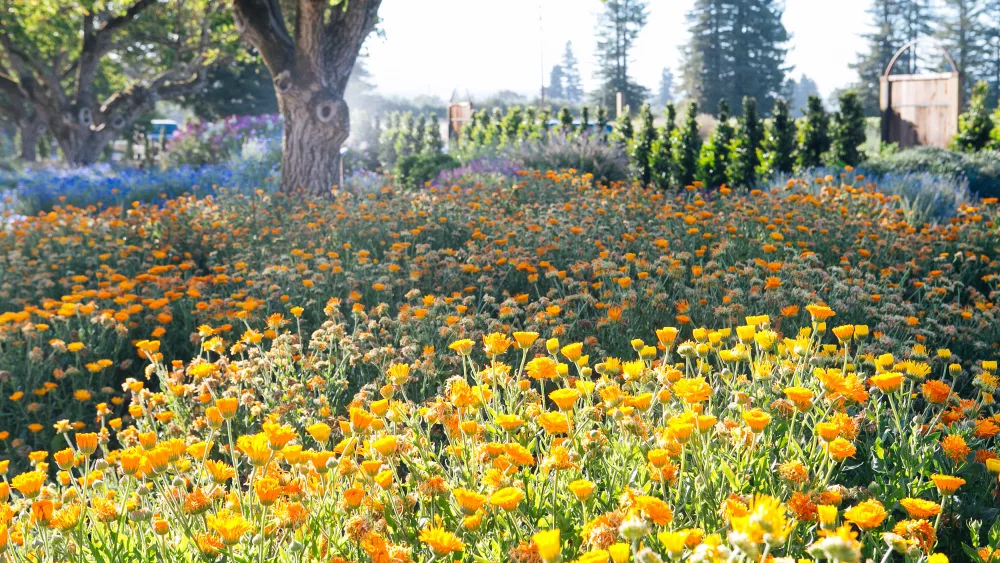As the sun sets behind Sonoma Mountain, a talented group of professional singers and dancers perform on a stage set within the old winery ruins at Glen Ellen’s Jack London Historic State Park. Transcendence Theatre Company’s production of Broadway Under the Stars includes hits from legacy musicals such as Mamma Mia!, Mary Poppins and Les Misérables to name a few. Similar to the writings of Jack London, their performances resonate and inspire.
A state park in jeopardy
Eight years ago, Transcendence shows would have been hard to imagine. To address a budget deficit during the 2011-2012 fiscal year, California listed Jack London as one of 70 state parks to close. Concerned that historic sites would be damaged if left unattended, locals hastily searched scrambled for ways to keep the park open.
That opportunity presented itself when Congressman Jared Huffman, then a state assemblyman, subsequently signed by Gov. Jerry Brown, allowing qualified nonprofits to manage state parks designated for closure. Valley of the Moon Natural History Association (VMNHA), a nonprofit with experience in supporting three area state parks, jumped at the chance.
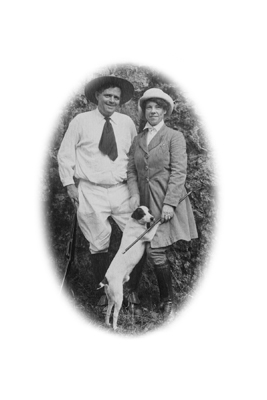 In a serendipitous moment, Transcendence Theatre Company (TTC) appeared on the scene wanting to save the park, too. Though it seemed these two organizations working together offered a solution to the problem, challenges remained. TTC was unknown, and the theatre company needed to prove they were up to the task of staging performances, supported by local audiences, in a state park of historical significance. VMNHA was also in uncharted territory. The new legislation, AB42, had yet to be tested. No nonprofit had ever managed a state park. And the park, covering 1,400 acres with historical sites, was special.
In a serendipitous moment, Transcendence Theatre Company (TTC) appeared on the scene wanting to save the park, too. Though it seemed these two organizations working together offered a solution to the problem, challenges remained. TTC was unknown, and the theatre company needed to prove they were up to the task of staging performances, supported by local audiences, in a state park of historical significance. VMNHA was also in uncharted territory. The new legislation, AB42, had yet to be tested. No nonprofit had ever managed a state park. And the park, covering 1,400 acres with historical sites, was special.
A night to remember
The theatre company’s moment arrived on an evening in October 2011 when California State Parks issued a one-time permit for a benefit performance. “We borrowed from our parents to cover the costs and reached out to our Broadway performer friends who came and performed for free,” says Stephan Stubbins, co-executive director and chief marketing officer. That evening Amy Miller, artistic director, walked out onto the stage, flashed a radiant smile and recited the words of Jack London:
“I would rather be ashes than dust, I would rather that my spark should burn out in a brilliant blaze than it should be stifled by dry rot. I would rather be a superb meteor, every atom of me in magnificent glow, than a sleepy and permanent planet. The proper function of man is to live, not exist. I shall not waste my days trying to prolong them. I shall use my time.”
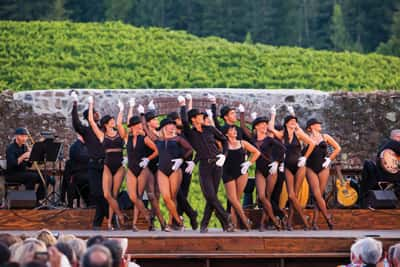 And then, the show began, the night resonating with the up-lifting, inspirational music of Broadway. Following the finale, the crowd responded with a thundering standing ovation.
And then, the show began, the night resonating with the up-lifting, inspirational music of Broadway. Following the finale, the crowd responded with a thundering standing ovation.
“We expected 200 people to attend,” says Chuck Levine, board director of the VMNHA. “Instead close to 800 showed up. It was an amazing evening.” An enthusiastic Ruth Coleman, head of California State Parks, came on stage and spoke to the audience about the importance of state parks in showcasing the arts.
The all-volunteer, nonprofit organization, Valley of the Moon Natural History Association (VMNHA) was formed in 1977 to support three Sonoma Valley state parks—Annadel, Sugarloaf Ridge and Jack London. Using membership dues, donations and grants they provided funding for park projects, educational exhibits and trail maps. Together with the California State Mounted Assistance Unit, they supported horseback and bicycle patrols. Monies also went to maintain the garden at Jack London cottage and pay for the acquisition of motorized carts so those with disabilities have full access to the park.
With long-time state parks involvement and impeccable credentials, VMNHA seemed the perfect test case for AB42. And that proved to be true. In 2012, the organization operating as Jack London Park Partners (JLPP), became the first non-profit to manage a state park. The management agreement for an initial period of five years became a model for other nonprofit and state park collaborations.
The permit process
California State Parks requires a project evaluation form (PEF) be completed and approved for new park activities. With park management assured, TTC moved ahead to complete a PEF and obtain the permit required for performances. Transcendence’s form included detailed operating procedures with prohibitions against touching masonry walls, fastening set decorations to historic structures, driving stakes into the ground or using confetti, glitter or other materials that might harm the environment, along with other criteria. 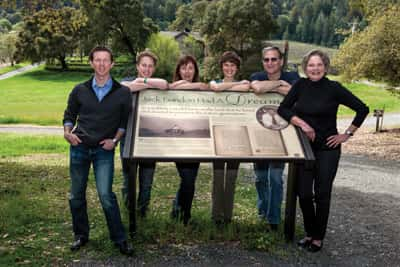
California State Parks issued TTC special one-year permits for 2012 and 2013, and a five-year special permit for 2014 to 2019. A permit was recently renewed through 2024 with the number of permitted performances increased from 22 to 30. At each stage of the permit approval process the form was updated.
Genesis
The idea for TTC came about when 14 performers set aside their Broadway and television careers to perform for four months in Punta Banda, Mexico. “We saw the impact the shows had on the community. And that experience changed our lives,” Miller says. From a home base in Los Angeles, six of the cast toured the country seeking a site, while getting advice and suggestions as to how to make a Theatre company sustainable. And the end of that trip they chose Sonoma, and the opportunity to save a park.
Park performances by the theatre group are complex logistical and planning endeavors that include: the creation of theme concept, casting, securing partnerships, sponsorships and donors, signing contracts, locating housing for artists, staging and rehearsals. “We have 42 volunteers at each show who assist with set-up and take down. Many of the volunteers are also park docents,” says Brad Surosky, co-executive director and chief operating officer. “Their behind-the-scenes support enables us to do what we do on stage.”
Pre-show picnickers are encouraged to use reusable plastic plates, and biodegradable cups, cutlery, napkins as well as recyclable containers. The theatre company’s near-no-waste initiative complements JLPP’s Green Team recycling program. Following performances, blue containers set around the grounds are emptied and trash is taken to a park sorting area. There, volunteers separate out recyclables into categories required by CalRecycle—brown, green and white glass, cans, plastic bottles and recyclable, non-refundable. Sorted bags are taken to Santa Rosa’s reclamation center and monies received go toward park operating expenses.
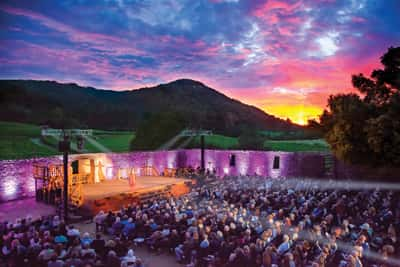 The Jack London Green Team includes residents from nonprofit Sweetwater Spectrum, Sonoma’s community for young adults with autism and other developmental disabilities. “Our residents have been involved with the park’s recycling program for over five years. Sorting is something residents enjoy doing. Volunteering at the park is great for their confidence and self esteem. And afterwards they go on a hike in a beautiful place. It’s a win-win,” says Kory Stradinger, executive director, Sweetwater.
The Jack London Green Team includes residents from nonprofit Sweetwater Spectrum, Sonoma’s community for young adults with autism and other developmental disabilities. “Our residents have been involved with the park’s recycling program for over five years. Sorting is something residents enjoy doing. Volunteering at the park is great for their confidence and self esteem. And afterwards they go on a hike in a beautiful place. It’s a win-win,” says Kory Stradinger, executive director, Sweetwater.
Fans of the theatre company return season after season, including Georgia Schall of Novato. “I’ve been attending Transcendence performances along with my family and friends for the past five years,” says Schall. “We’re delighted with the incredible talent, the shows and the magical park setting. This year we particularly enjoyed A Chorus Line, Transcendence first full musical, and Those Dancing Feet, a show about love. Afterwards, a woman was invited onstage. A man rushed forward, dropped on one knee and proposed. What a surprise for her and the audience! She said, ‘Yes.’”
The Londons love for music
“TTC fits well with park history,” says Tjiska Van Wyk, JLPP executive director. “Charmian and Jack loved music. Charmian was a concert pianist. Before she and Jack got married, she bought the Steinway piano that’s now in the museum. As a gift, Jack paid off the balance. His favorite song was “Valley of the Moon.” The London’s were sociable people. They entertained many guests at Beauty Ranch. I can imagine them sitting in the audience watching a Transcendence performance, enjoying the moment.”
Since 2012, the number of park visitors has doubled from 50,000 to more than 100,000. “That increase can be attributed to several things—an all-out initial public relations effort, several events designed to engage community, promotion of annual passes, and TTC,” says Van Wyk. “The theatre group performances have brought people to the park who’d never been before. And they return with their friends to hike, picnic and participate in other activities.” Since 2012 TTC has raised more than $500,000 dollars for park operations, entertained 81,000 visitors and energized a community. Working together, TTC and JLPP have created a unique synergy that has succeeded beyond expectations.
Every quarter volunteers conduct a visitor survey. “As managers we want to know how we’re doing,” Van Wyk says. “Ninety percent of visitors ranked us ‘excellent,’ the highest score possible, said they would come back. That ranking has been consistent for a long while.”
“The state wanted to do so much more in the park, but the monies just weren’t there. With the additional revenues from TTC, special events, contributions from the public, and visitor entry fees we can tackle projects that had been put on hold,” says Van Wyk. “With California State Parks oversight, we restored the crumbling walls in winery ruins and installed an Americans with Disabilities Act compliant pathway leading from the parking lot. We were also able to raise $850,000 for museum restoration.”
More activities
Before 2012, with state resources limited, Jack London Park was closed two days each week. The kiosk, where entry fees are collected, only opened on weekends. During the week, visitors paid on the honor system. “The park is now open every day except Christmas and volunteers staff the kiosk,” says Susan St. Marie, former state park aide, now director of programs and volunteer management for Jack London Park Partners. “Our team of 300 dedicated volunteers enables us to do this. All have completed a two-day training program. Volunteers greet visitors, lead tours, man the museum and bookshop, help with special events, and so much more.”
Jane Merryman, a volunteer for 30 years, says, “Through volunteering I’ve met people from all over the world who’ve read Jack’s books. An elderly man told me he read London’s stories as a school assignment in Mongolia. Park staff is delightful to work with. By being a park volunteer, I feel I’m part of something people care about. And Jack London and I share the same birthday—January 12!”
Partnering together
In addition to Broadway Under the Stars, the two nonprofits—TTC and JLPP—support the community in a number of other ways. Both focus on introducing and involving the younger generation in nature and the arts.
TTC’s Kids Camp involves two weeks of workshops for blossoming artists ages 8 to18. The workshops offer arts and values training with Broadway artists, and an opportunity to create songs they then perform as a part of Transcendence’s “Fantastical Family Night.”
“Kids Camp is designed to build confidence, inspire creativity and instill well-being in a non-competitive and nurturing environment,” says Stubbins. The camp ensures opportunities are available to all through needs-based half and full scholarships.
TTC also offers 20 apprentice and internships that provide mentoring and expert training in all aspects of the Theatre. Ideal candidates are detail-oriented, demonstrate initiative, have a sense of humor, and interested in using the arts for community service.
The last two years, in collaboration with the nonprofit La Luz Center, TTC developed a summer theatre partnership. A self-empowerment program dubbed “Soy Yo,” (It’s Me) provided an opportunity for 30 students to individually explore voice and dance. La Luz then also received 400 tickets over a two-year period for the Broadway Under the Stars performances of Shall We Dance and Those Dancin’ Feet. The show and bi-lingual pre-show experience was dedicated to the Latino community, and Latino-owned food vendors, wine businesses and local Latino musicians participated in pre-show picnic festivities.
Additionally, Jack London Park provides guided and unguided school tours for grades K-12. In 2018, 970 students from area schools participated. “I’ve been taking my third grade classes to the park for the past 10 years,” says Gwen Watson, a teacher at Prestwood School in Sonoma. “Seeing London’s typewriter, the interesting artifacts brought back from his adventures around the world, and viewing all his books translated into many languages are some of the students’ exciting discoveries. Now in high school and college, these former students remember their visit to the park as a highlight of third grade. Current students are becoming fluent readers and developing sophisticated writing skills. What better way to inspire them than a day at Jack London Park?”
Kristina Ellis, tours and education manager is excited about the parks seventh grade ecology program rolled out last year to three Sonoma Valley schools. “The multi-grant program helps middle school teachers meet next generation, state mandated ecology educational standards. “Focus is on biodiversity and ecosystem dynamics, extends over three sessions and includes visits to the school. Students fill out data sheets for birds, invertebrates and plant varieties observed on the school campus and compare that with observations made during a park field trip.” The seventh grader program is a pathway partnership with the nonprofit Sonoma Ecology Center. Their sixth grade program focuses on climate change and includes field trips in Sugarloaf State Park. “Our school tours and programs are very much in line with London’s interest in conservation and the environment,” says Ellis. “Most know of him as a writer and an adventurer, few realize that he was a sustainable farmer, a man ahead of his time.”
The beauty of the land
When two nonprofits collaborate with the state, it shows what can happen when all involved come together for the common good and in keeping with the spirit the Londons had for the beauty of the land they loved so much. As Jack London once wrote in the book John Barleycorn: “I ride over my beautiful ranch…The air is wine. The grapes on a score of rolling hills are red with autumn flame. Across Sonoma Mountain, wisps of sea fog are stealing. The afternoon sun smolders in the drowsy sky. I have everything to make me feel I’m alive.”


